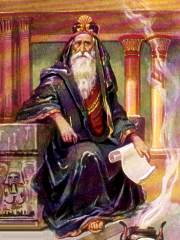 Well, after a pleasant romp through the epistles of John and the letter to the Ephesians, my daily Bible study book is back in the books of Chronicles. Today's study, on 2 Chronicles chapter 8, has me raising my eyebrow. The last time I posted on a difficult passage from Chronicles, it was the occasion for quite an invigorating discussion. So, here we go. Let's see what happens.
Well, after a pleasant romp through the epistles of John and the letter to the Ephesians, my daily Bible study book is back in the books of Chronicles. Today's study, on 2 Chronicles chapter 8, has me raising my eyebrow. The last time I posted on a difficult passage from Chronicles, it was the occasion for quite an invigorating discussion. So, here we go. Let's see what happens.OK, I assume you've read the chapter by now. It's only 16 verses - no biggie. I don't know what you think of it - pretty boring stuff, perhaps - but my study guide zeroed in on two things: Solomon's sin in subjecting non-Israelites to oppressive slave labor, and Solomon's sin of polygamy.
My reaction to these emphases is: whatever happened to the "plain sense of scripture"? Try as I might, I can't detect the slightest hint of disapproval of either of these things in the Biblical narrative. This chapter is a list of Solomon's great accomplishments. How does one get the idea that these are presented as "sin"? Granted, my commentator is correct (from our modern point of view) in pointing out that this oppressive slavery was contrary to the spirit of the Exodus. But my reading of the text is that this point was lost on the Chronicler. I read it as, "Yeah! Solomon conquered Hamath-zobah! Solomon kept the Amorites and Hittites under his thumb! Go Solomon!" And granted, Solomon's son Rehoboam is portrayed as a fool (which he clearly was) a few chapters later when he says to his people, "You thought Dad was bad? You don't know the meaning of bad!!" But here, I don't read any judgment of Solomon's actions. Nor is there judgment of his polygamy. It's just a fact. Solomon built a country home for his Egyptian wife because somebody (Solomon? His wife? The priests?) was uncomfortable with her pagan proximity to where the Ark of the Covenant had been. Sounds prudent, but it's not judged - or if there is a hint of judgment, it's because of her paganness, not his polygamy.
So my commentator springboards from this to an exhortation to safeguard Biblical morality against the "onslaught on Christian values" in today's culture. But what is Biblical morality? To read a passage like this as condemning things like slavery and polygamy is, it seems to me, to impose our concept of morality on the Bible, not to read and listen to what the Bible says. Now, I'm certainly not arguing that slavery and polygamy are good - that's not my point at all - but I am asking: who and what are we serving when we so blatantly make the Bible say what we want it to say? We all do this - it's unavoidable; we're humans and whether we like it or not we see things through our ego-lenses. But I don't know. Am I crazy, or is this kind of Biblical interpretation at best powerful self-delusion and at worst outright deceit? And either way, how can it possibly help us serve God and others?
Anyway, I give you a topic. Discuss. :-)
No comments:
Post a Comment